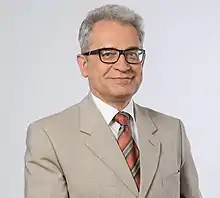Włodzimierz Marciniak Ph.D. | |
|---|---|
 | |
| Poland Ambassador to Russia | |
| In office 13 October 2016 – 31 July 2020 | |
| President | Andrzej Duda |
| Preceded by | Katarzyna Pełczyńska-Nałęcz |
| Succeeded by | Krzysztof Krajewski |
| Personal details | |
| Born | March 31, 1954 Łódź |
| Nationality | Polish |
| Profession | Political scientist, historian, university teacher |
Włodzimierz Aleksander Marciniak (born 31 March 1954,[1] Łódź) is a Polish university teacher, political scientist and historian of Russia, an ambasador to Russia (2016–2020).
Life
Marciniak, in 1976, graduated from political science at the University of Warsaw. From 1977 to 1980 he was doing his doctoral studies.[2] In 1989, he defended his thesis on Marxist social philosophy, supervised by Marek Siemek. In 2001, he gained post-doctoral degree (habilitation), presenting a book on dissolution of the Soviet Union.[3]
In 1980, he began his professional career as a scientist and university teacher at the Main School of Planning and Statistics in Warsaw (in 1991 renamed Warsaw School of Economics, SGH). Between 1992 and 1997 he was working as a counsellor at the Polish embassy in Moscow. In 1997, Marciniak returned to SGH, between 2001 and 2002 heading its Department of Political Studies. Since 2000, he has been working also for the Institute of Political Studies of the Polish Academy of Sciences. In 2002, he became head of the Comparative Postsoviet Research Unit. Between 2006 and 2008 he was a lecturer at the Centre for East European Studies, University of Warsaw. He has been a visiting professor of the Jesuit University of Philosophy and Education Ignatianum, Kraków,[4] and Wyższa Szkoła Biznesu – National-Louis University, Nowy Sącz.[5]
Marciniak has been a member of the Polish-Russian Group for Difficult Matters,[6] and the presidential National Development Council (since 2010).[7]
On 13 October 2016, he became Poland ambassador to Russia,[8] presenting on 9 November 2016 his letter of credence.[9] He ended his term on 31 July 2020.[10]
His brother,[11] Piotr Marciniak, was a member of Parliament of Poland (1993–1997), ambassador to Moldova (2000–2005), as well as consul-general in Irkutsk (2008–2009) and Saint Petersburg (2011–2015).[12]
Works
References
- ↑ "Włodzimierz Marciniak". ksiazki.wp.pl (in Polish). 2010-04-14. Retrieved 2019-10-04.
- ↑ "cv". politologia.wsb-nlu.edu.pl (in Polish). 2009-05-16. Archived from the original on 2009-05-16. Retrieved 2019-10-04.
- ↑ "Nowa Nauka Polska". nauka-polska.pl. Retrieved 2019-10-04.
- ↑ "Ambasador Nadzwyczajny i Pełnomocny RP w Federacji Rosyjskiej". moskwa.msz.gov.pl (in Polish). Retrieved 2019-10-04.
- ↑ "Marciniak Włodzimierz". politologia.wsb-nlu.edu.pl (in Polish). 2016-03-05. Archived from the original on 2016-03-05. Retrieved 2019-10-04.
- ↑ "Uczestnicy posiedzenia GST, Warszawa, Pałacyk MSZ na Foksal 6, 31 maja – 1 czerwca 2012". msz.gov.pl (in Polish). June 2012. Retrieved 2019-10-04.
- ↑ "Oficjalna strona Prezydenta Rzeczypospolitej Polskiej / Archiwum Lecha Kaczyńskiego / Narodowa Rada Rozwoju / Skład Rady". www.prezydent.pl (in Polish). 2010. Retrieved 2019-10-04.
- ↑ "Nowy ambasador RP rozpoczął pracę w Moskwie". fakty.interia.pl (in Polish). 2016-10-14. Retrieved 2019-10-04.
- ↑ "Putin o stosunkach z Polską: Odbudowanie dialogu jest możliwe". wiadomosci.dziennik.pl (in Polish). 2016-11-09. Retrieved 2019-10-04.
- ↑ "Postanowienie Prezydenta Rzeczypospolitej Polskiej z dnia 14 maja 2020 r. nr 110.19.2020 w sprawie odwołania Ambasadora Rzeczypospolitej Polskiej". isap.sejm.gov.pl (in Polish). 2020-05-14. Retrieved 2020-08-01.
- ↑ "Kraj kiosków z ciepłą wódką". Dziennik (in Polish). 12–13 April 2008.
- ↑ "Konsul Generalny". sanktpetersburg.msz.gov.pl (in Polish). 2013-02-18. Archived from the original on 2013-02-18. Retrieved 2019-10-04.